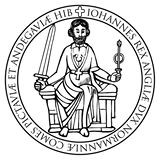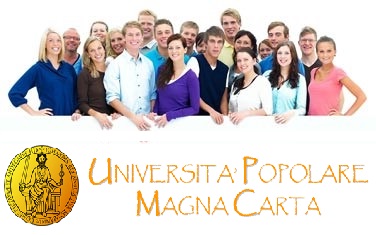The pragmatism of the Universities of the People
- The Magna Carta University of the People -
Interview by Alessandra Zocca
|

|
|
Alessandra Capelli
President of the Magna Carta University of the People in Cremona (Italy)
Vice-President Italy of the Magna Carta University of the People
|
Alessandra, what are the so called “Universities of the People”?
The Universities of the People are organisations created with the main goal of providing permanent training and education services, and to diffuse culture. Their cultural scope includes different domains of knowledge, science, sport and charity.
When were they founded and how widespread are they?
In Italy the first Universities of the People were founded at the end of the 1800s. In that period, the economic unfavorable situation made it difficult for the majority of the population to acquire that elementary knowledge that would permit them to live and work in better conditions. Education was a prerogative of very few people.
The Universities of the People not only made a huge effort in teaching an increasing number of citizens of every age and status, but they also involved men of great culture and famous professors. These men wanted to offer part of their time and competencies in the cause of Universities of the People, which represented for them a sort of charming and “non-conformist” challenge. For example some of the most eminent Italian professors were: Gabriele D’Annunzio, Benedetto Croce, Giovanni Bovio, Ludovico Mortara, Gioacchino Volpe, Luigi Einaudi, Gaetano Salvemini, Francesco Pullè and many others.
How do Universities of the People differ to other Universities, including the Universities of the Third Age?
The nowadays Universities of the People share the same nineteenth century principles, which inspired of the first Universities of the People, i.e. they are: non-party, non-political and open to everyone.
The Universities of the People must be distinguished from other kinds of Universities/ cultural institutions, named in a similar way (i.e. e. the University of the Third Age, the University of the Free Age, the University of the Free Time, etc.) because they have different objectives and they belong to different popular university associations. The Universities of the Third Age, for instance, address a specific audience, the senior people, referred to as “third age”.
The Universities of the People shouldn’t be confused either with the Traditional Universities because they offer different disciplines, they have different access prerequisites and they issue different diplomas/ certificates at the end of their curricula.
 The Universities of the People, belonging to C.N.U.P.I. (1), like the Università Magna Carta (2), are institutions open to everybody, without distinction of age, sex, religion and ethnic group. They share the inspiring philosophy and the traditions of the first Italian Universities of the People, but they are adjusted to serve the current training needs and they adopt the most innovative education methods and technology.
The Universities of the People, belonging to C.N.U.P.I. (1), like the Università Magna Carta (2), are institutions open to everybody, without distinction of age, sex, religion and ethnic group. They share the inspiring philosophy and the traditions of the first Italian Universities of the People, but they are adjusted to serve the current training needs and they adopt the most innovative education methods and technology.
It is then up to C.N.U.P.I. to protect their associates’ reputation and name from other organisations who try to usurp the name and the history of the authentic Universities of the People.
The Universities of the People offer a variety of education and professional training opportunities:
• Cultural curricula aiming to increase the participant’s general culture and disciplines related to areas neglected by the traditional universities
• Professional training focused on providing students with a specific expertise in order to help them become qualified to access the job market. These curricula are addressed to people who already have a university degree and who want to get a specialization, or/and to those who want to qualify for a specific profession.
Which are the most famous ones?
In Italy there are currently 85 Universities of the People with the appropriate requisites.
Amongst the most famous Universities of the People we can count the University of the People of Milan, founded in 1901, the University of the People of Turin founded in 1900 and the University of the People of Florence established in 1901.
The University of the People of Milan, whose opening speech was made by the Italian poet Gabriele D’Annunzio on the 1st March 1901, founded the Milan Museum (3) of the Universities of the People, created with the goal of documenting the academic, social and cultural phenomenon of the birth and growth of these educational institutions.
Alessandra, what is the mission of the Magna Carta University? When and where was the Magna Carta University of the People founded? How many locations does it have in Italy?
How is it funded?
The Magna Carta University of the People (Magna Carta UoP) is quite recent, created in 2011.
Even if recently founded, we share the same mission as the first inspiring Universities of the People: through professional training curricula, business update courses and specific operative training we offer cultural growth to the highest possible number of people, and we help our students to get qualified for a new financial independence/profession. These are our primary goals.
In Italy we have seven premises (Cremona, Verona, Mantua, Bergamo, Brescia, Milano and Monza) and two new premises are being setting up (Vicenza and Ferrara).
The Magna Carta UoP is a self-funding institution through our tuition fees.
Why is it called Magna Carta?
 This name was inspired by the Magna Carta declaration (also called Magna Carta Libertatum or The Great Charter of the Liberties of England).
This name was inspired by the Magna Carta declaration (also called Magna Carta Libertatum or The Great Charter of the Liberties of England).
The Magna Carta was the first document (originally issued in Latin ) forced onto a King of England – King John, also known as John Lackland, brother of King Richard the Lionheart - by a group of his subjects, the feudal barons, in an attempt to limit his powers by law and to protect their rights. As you can see, King John is the icon of our university logo.
The Magna Carta represents, though in the framework of the customs of feudal law, the first fundamental document which universally acknowledged the human rights of citizens.
The natural consequence of human rights acknowledgement is freedom and, as far as our motto is “Only education and culture make a person free”, we thought that we could not select a better name than Magna Carta.
What are the main disciplines which are taught? What is the average duration of courses? Does Magna Carta issue diplomas or certificates? How expensive are courses?
Our Academic Curricula are reviewed and updated every year, the different courses change in order to avoid repeatedly preparing the same professional profiles, who could risk not to be absorbed/ employed by the local labour market.
In order to satisfy the job market needs we also yearly expand the academic offer by including brand-new courses to help students fulfilling new professional profiles.
The sectors and the disciplines covered by the Università Magna Carta curricula plan are the following:
• The recovery of old artisanal jobs (for example: tailor, etc.)
• Wellbeing and holistic disciplines
• The architecture sector
• Law and management disciplines
• Personal development disciplines.
Our courses meet high quality standards and the vast majority of them have a medium/long term (i.e. e. annual or biennial courses).
Students do not attend only theoretical lectures, but above all the emphasis is given to the practical part, performed during the courses or/and through traineeships. This learning method allows students to be ready to start their new profession after their final examination. In fact, immediately after their courses a lot of our students have found a job or they have decided to open their own business.
No school prerequisite is required to access our courses.
At the end of each course students receive a certificate of attendance including the mark obtained, the number of hours attended and the curriculum program/content.
The Magna Carta University fees are – according to our mission - intentionally low and competitively priced because we want to make it easy for everybody to attend, and grow culturally and professionally.
Who are the teachers? Who are the students?
 Our teachers
Our teachers are highly motivated professionals and professors, with a strong expertise in the subject they teach. They share fully the values and the principles of the authentic universities of the people.
Students are comprise all those people who are really motivated to learn, to follow their passions, to reinvent themselves, to build their new profession or to increase their employment opportunities.
In our classrooms you can find people from sixteen to seventy years old, everybody engaged for different reasons, and it’s great, because this allows diverse generations to meet, new synergies to take place and life experiences to be shared.
Regarding the number of the students, I can tell you some of our annual figures, for example 400 students in Cremona, 350 in Mantua and 300 in Verona.
What are your future plans for Magna Carta?
Our priority project is to expand the national coverage of the Università Popolare Magna Carta, especially in those areas where no C.N.U.P.I. (1) associated university is present or close by.
Then, the second objective is to increase our curriculum offered by responding to the needs of the different local job markets.
Is the Magna Carta University of the People acknowledged by the European Association for the Education of Adults (EAEA) (4) whose purpose is to link and represent European organisations directly involved in adult learning?
The Università Popolare Magna Carta - being a member of the C.N.U.P.I. (1) association - is acknowledged by the European Association for Educations of Adults (EAEA), who co-operates with UNESCO and the European Parliament to stimulate, steer and concretize policies to increase and disseminate culture.
Alessandra, what inspired you to become the Dean of the University of the People in Cremona and the vice-president of Magna Carta University?
I accepted the role of dean and vice-president because I fully share the mission and the principles of the universities of the people, my aim is to provide learning and growth opportunities to everybody and at an accessible price.
I have been professionally involved in education and training for over sixteen years, and apart from some work experiences in the construction industry and in the quality certification practice, my work has always dealt with the development of education curricula. My current work with the Magna Carta University has proven to be the most rewarding professional experience for me because we put people, and not profits, at the centre of our concerns.
What are the dreams that have not yet come true in your life? Do you have “a dream” you would like to share?
I have got a lot of dreams, a long list! A dream that I have already made into a reality is to become more and more a reference point for professional education at the national level, to increase the reputation of the Magna Carta University and also to expand our services abroad.
I am glad to share my enthusiasm, which grows every day, with the readership of the PWI Magazine, my intense passion for my work, and my will to continue this great project, because I truly believe that “only culture make individuals free”. Knowledge and education are eye-openers, which allow us to see the opportunities and options of many possible developments in our lives. They also help us make choices upon our own principles built over time and to refuse imposed choices. They give us intellectual independence which permits us to believe in what is better for ourselves.
Short Biography
|
|
Alessandra Capelli was born in Cremona in 1976.
After her commercial and law studies, she worked in the construction industry and in the area of ISO 9000 quality standards.
After professional experiences in private schools Alessandra joined the world of the Universities of the People. Rapidly she became the President of the University of the People of Cremona and the Vice-President of Magna Carta University of the People at national level.
Contact Details
Alessandra Capelli
President of the Magna Carta University of the People in Cremona (Italy)
Vice-President Italy of the Magna Carta University of the People
alessandra.capelli@hotmail.it
www.universitapopolaredicremona.it
http://www.universitapopolaremagnacarta.it/default.asp
|
Disclaimer -
Any views and opinions presented in this article are solely those of the author and do not necessarily reflect those of Università Popolare Magna Carta, nor do they constitute a legally binding agreement.
.png)
.png)
